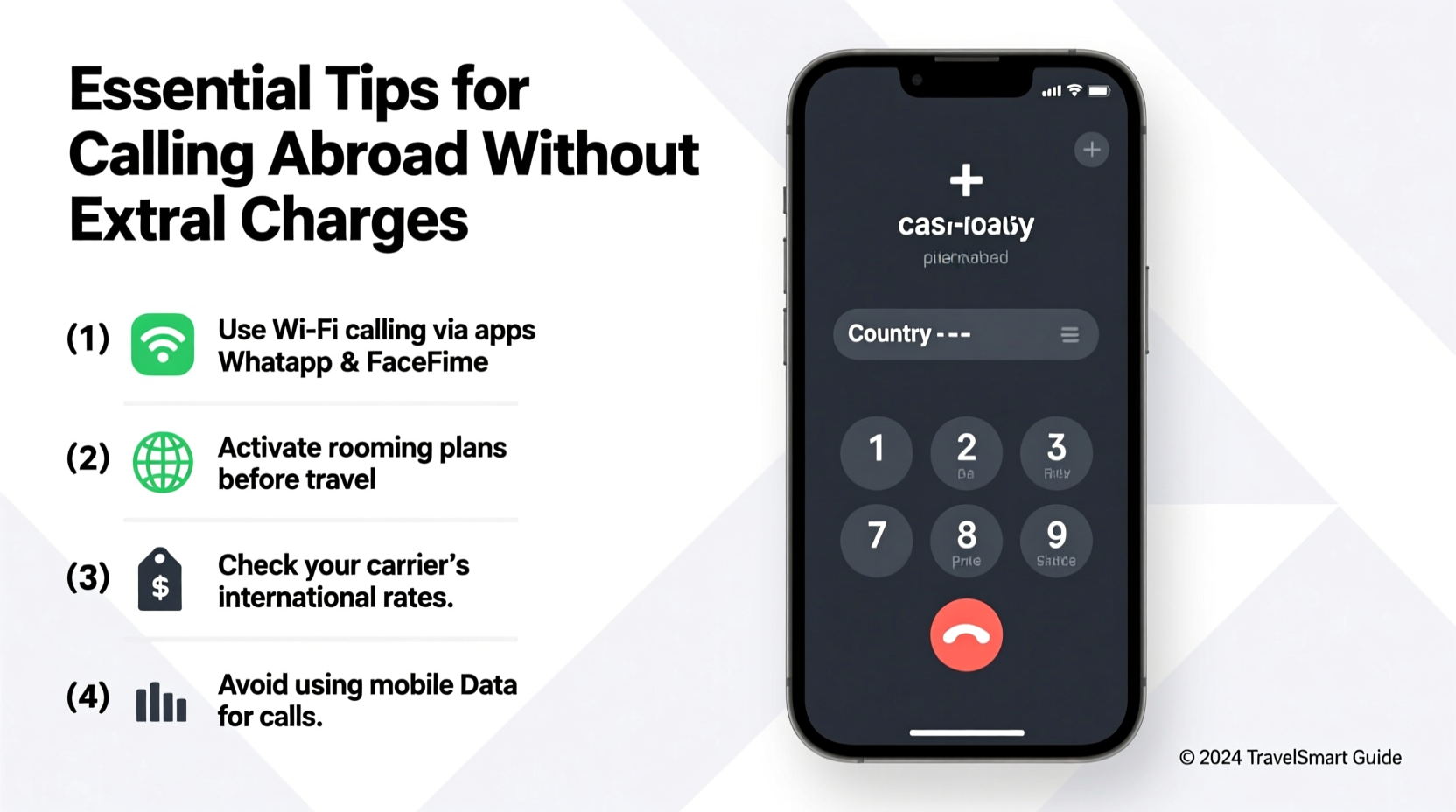Staying connected while traveling internationally shouldn’t come at the cost of an inflated phone bill. Many travelers assume that calling or receiving calls abroad automatically means high roaming fees, but with the right preparation and tools, you can communicate freely—without the financial sting. Whether you're on a business trip, visiting family, or exploring a new country, understanding how to make international calls efficiently is crucial. The key lies in combining technology, planning, and carrier knowledge to keep your communication costs low or even zero.
Understand How International Roaming Works

When you use your mobile phone outside your home country, your device typically connects to a foreign network through a process called roaming. While convenient, traditional roaming often comes with steep charges for calls, texts, and data. These fees are imposed by both your home carrier and the host network. Voice calls made from your phone while abroad may cost several dollars per minute, especially if you're calling back home.
Carriers like Verizon, AT&T, and T-Mobile do offer international plans, but they aren’t always included by default. Some postpaid plans now include limited or unlimited international calling to certain countries, but coverage varies. Always check your specific plan details before traveling.
Leverage Wi-Fi Calling and Messaging Apps
One of the most effective ways to avoid charges when calling abroad is to bypass the cellular network entirely. Wi-Fi calling allows you to make voice calls using a stable internet connection instead of relying on local carriers. Most modern smartphones support Wi-Fi calling, but it must be enabled in your phone settings and supported by your carrier.
To activate Wi-Fi calling:
- Go to Settings > Phone (or Network & Internet on Android).
- Select \"Wi-Fi Calling\" and toggle it on.
- Confirm your emergency address (required for safety services).
Once enabled, as long as you’re connected to Wi-Fi, you can make and receive calls just as if you were at home—no additional fees apply.
In addition to Wi-Fi calling, messaging apps such as WhatsApp, FaceTime, Skype, Google Meet, and Telegram offer free voice and video calls over the internet. These apps are widely used globally and require only that both parties have the app installed and an internet connection.
| App | Calling Type | Internet Required? | Cost |
|---|---|---|---|
| Voice & Video | Yes | Free | |
| FaceTime | Voice & Video | Yes | Free (Apple devices only) |
| Skype | Voice, Video, SMS | Yes | Free (to other users); low rates to phones |
| Google Voice | Voice & Text | Yes | Free within U.S.; low rates internationally |
Use Local SIM Cards Strategically
If you plan to stay in a foreign country for more than a few days, purchasing a local SIM card can be a cost-effective solution. Local SIMs provide a domestic phone number and affordable calling, texting, and data rates. Most countries allow tourists to buy prepaid SIMs at airports, convenience stores, or mobile provider outlets.
To use a local SIM:
- Ensure your phone is unlocked (contact your carrier if unsure).
- Purchase a SIM from a reputable provider in the destination country.
- Insert the SIM and follow activation instructions (often via app or website).
- Share your temporary number with contacts who need to reach you.
You can keep your original SIM active by storing it safely or using a dual-SIM phone. This way, you maintain your primary number for emergencies or important notifications while using the local SIM for daily communication.
“Travelers who rely solely on roaming pay up to 10 times more than those using local SIMs or VoIP solutions.” — Carlos Mendez, International Telecom Analyst
Step-by-Step Guide to Calling Abroad Without Charges
Follow this practical timeline to ensure seamless, low-cost communication during your next international trip:
- 7 Days Before Travel: Check your carrier’s international policies. Inquire about Wi-Fi calling availability and any travel passes (e.g., T-Mobile's International Plan or AT&T's International Day Pass).
- 3 Days Before: Download essential communication apps (WhatsApp, Skype, etc.) and test them on Wi-Fi. Ensure two-factor authentication methods don’t rely solely on SMS to your home number.
- Day of Departure: Enable airplane mode upon boarding, then turn on Wi-Fi and connect to airport internet to send updates via messaging apps.
- Upon Arrival: If staying longer than a week, purchase a local SIM. Use hotel or café Wi-Fi to set up your new number across apps.
- Daily Use: Make all outgoing calls over Wi-Fi using apps or Wi-Fi calling. Avoid dialing directly unless necessary and confirm rates first.
Real Example: Avoiding Charges in Japan
Sophie, a freelance designer from Chicago, traveled to Tokyo for a three-week project. She needed to stay in touch with clients and her family but wanted to avoid high roaming bills. Before leaving, she confirmed that her T-Mobile plan included unlimited Wi-Fi calling and data in Japan. She downloaded WhatsApp and informed her contacts to message her there instead of calling.
She also purchased a local SIM for backup and used it primarily for data navigation. By relying on Wi-Fi at cafes, hotels, and co-working spaces, she made all her client calls via Google Meet and received personal calls through FaceTime. Over three weeks, her total phone-related expenses were under $20—just the cost of the local SIM. Without these strategies, her bill could have exceeded $200.
Common Mistakes That Lead to Unexpected Charges
- Assuming roaming is free: Not all plans include international coverage. Double-check what’s included.
- Leaving data roaming on: Background apps can consume data quickly, leading to massive charges.
- Using SMS for verification: Some services send codes via text. Use email or app-based authentication instead.
- Not disabling auto-updates: App and system updates over data can use hundreds of MBs unknowingly.
Frequently Asked Questions
Can I receive calls abroad without being charged?
Yes, if you’re using Wi-Fi calling or a VoIP app like WhatsApp. Incoming calls over Wi-Fi are typically free. However, if you’re on a local network and someone calls your home number, standard roaming rates may apply to you as the recipient—check your carrier’s policy.
Do I need an internet connection to use Wi-Fi calling?
Absolutely. Wi-Fi calling requires a stable internet connection. It works over public or private Wi-Fi networks, but performance depends on signal strength and congestion.
Is it safe to use public Wi-Fi for calls?
While convenient, public Wi-Fi can pose security risks. Avoid sharing sensitive information on unsecured networks. Use apps with end-to-end encryption (like WhatsApp or Signal) for safer communication.
Final Checklist Before You Travel
- ☐ Confirm Wi-Fi calling is enabled and supported
- Contact your carrier and test the feature before departure.
- ☐ Download communication apps
- Install WhatsApp, Skype, FaceTime, or others used by your contacts.
- ☐ Unlock your phone if needed
- Ensure compatibility with local SIM cards.
- ☐ Purchase a local SIM (if staying long-term)
- Compare providers for best value in data and calling.
- ☐ Turn off data roaming
- Prevent accidental data usage on foreign networks.
Stay Connected Without the Cost
Calling a cell phone abroad doesn’t have to drain your wallet. With today’s technology and thoughtful planning, you can maintain clear, reliable communication anywhere in the world—for little or no cost. The real savings come not from luck, but from preparation: enabling Wi-Fi calling, using internet-based apps, and understanding your carrier options. Whether you're gone for a week or a year, these strategies empower you to stay in touch on your terms.









 浙公网安备
33010002000092号
浙公网安备
33010002000092号 浙B2-20120091-4
浙B2-20120091-4
Comments
No comments yet. Why don't you start the discussion?